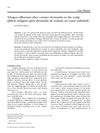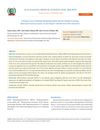7 citations,
March 2022 in “International Journal of Molecular Sciences” FGF21 can help reduce skin inflammation caused by C. acnes.
2 citations,
July 2017 in “Oman medical journal” A man with a rare adrenal cancer showed unusual symptoms and died four months after diagnosis.
4 citations,
January 2019 in “PubMed” Low dose valproate in epileptic children mainly causes weight gain and other non-life-threatening side effects.
 3 citations,
October 2022 in “Frontiers in Surgery”
3 citations,
October 2022 in “Frontiers in Surgery” Proteomics combined with other technologies can lead to a better understanding of skin diseases.
1 citations,
November 2023 in “Life” Hyaluronic acid injections can improve mouth opening and quality of life in scleroderma patients.
 1 citations,
February 2023 in “Drug Design Development and Therapy”
1 citations,
February 2023 in “Drug Design Development and Therapy” Plant adaptogens may help treat skin diseases and improve skin health, but more research is needed to fully understand how they work.
 July 2023 in “The Journal of Clinical Endocrinology and Metabolism”
July 2023 in “The Journal of Clinical Endocrinology and Metabolism” Gender-affirming hormone therapy improves physical performance in trans men to the level of cisgender men, while in trans women, it increases fat mass and decreases muscle mass, with no advantage in physical performance after 2 years.
7 citations,
January 2020 in “The journal of investigative dermatology/Journal of investigative dermatology” NIPP1 is important for healthy skin and could help treat skin inflammation.
 October 2010 in “Reproductive Biomedicine Online”
October 2010 in “Reproductive Biomedicine Online” Women with PCOS and androgenic alopecia have different triglyceride metabolism compared to those without hair loss.

A patient experienced intense hair loss due to telogen effluvium after scalp contact dermatitis, but hair regrew completely within two months without further treatment.
 77 citations,
April 2016 in “Science Advances”
77 citations,
April 2016 in “Science Advances” Researchers created a fully functional, bioengineered skin system with hair from stem cells that successfully integrated when transplanted into mice.
 40 citations,
October 2009 in “Journal of Biomedical Nanotechnology”
40 citations,
October 2009 in “Journal of Biomedical Nanotechnology” Pyrene excimer nucleic acid probes are promising for detecting biomolecules accurately with potential for biological research and drug screening.
 13 citations,
March 2014 in “Cutaneous and Ocular Toxicology”
13 citations,
March 2014 in “Cutaneous and Ocular Toxicology” Oral isotretinoin for severe acne can change hormone levels but does not significantly affect ovarian function.
 8 citations,
September 1997 in “Postgraduate medicine”
8 citations,
September 1997 in “Postgraduate medicine” Older women often have vulva issues due to less estrogen, which can be misdiagnosed and lead to wrong treatments.
 3 citations,
January 2021 in “Actas Dermo-Sifiliográficas”
3 citations,
January 2021 in “Actas Dermo-Sifiliográficas” The document concludes that changing the scalp's microbiome might be a new way to treat hair loss.
 January 2016 in “Springer eBooks”
January 2016 in “Springer eBooks” New materials and methods could improve skin healing and reduce scarring.
 October 2010 in “Reproductive Biomedicine Online”
October 2010 in “Reproductive Biomedicine Online” A new method can almost perfectly distinguish adenomyosis from similar conditions using blood tests.
 4 citations,
February 2023 in “Journal of steroid biochemistry and molecular biology/The Journal of steroid biochemistry and molecular biology”
4 citations,
February 2023 in “Journal of steroid biochemistry and molecular biology/The Journal of steroid biochemistry and molecular biology” The study found that certain mutations in the vitamin D receptor can cause rickets and potentially affect hair growth.
1 citations,
August 2016 in “Hanbang an'i'bi'in'hu pibu'gwa haghoeji” YangHyulEum Gami-Bang extract may help treat hair loss.
 51 citations,
May 2011 in “Phytotherapy Research”
51 citations,
May 2011 in “Phytotherapy Research” Ginseng, especially red ginseng, may help regrow hair and block a hair loss-related enzyme.
 1 citations,
December 2015 in “Endocrinology”
1 citations,
December 2015 in “Endocrinology” Decanoic acid may help treat PCOS by reducing androgen levels and improving glucose sensitivity.
 October 2021 in “Acta Scientific Medical Sciences”
October 2021 in “Acta Scientific Medical Sciences” A woman was diagnosed with a rare adrenal gland cancer that did not show usual hormone-related symptoms.
 120 citations,
August 2008 in “The journal of investigative dermatology/Journal of investigative dermatology”
120 citations,
August 2008 in “The journal of investigative dermatology/Journal of investigative dermatology” Cytokeratin 19 and cytokeratin 15 are key markers for monitoring the quality and self-renewing potential of engineered skin.
 35 citations,
March 2012 in “Experimental and Clinical Endocrinology & Diabetes”
35 citations,
March 2012 in “Experimental and Clinical Endocrinology & Diabetes” The conclusion is that accurately identifying the cause of high androgen levels in women with PCOS is crucial and requires specific tests.
 10 citations,
July 2014 in “Veterinary dermatology”
10 citations,
July 2014 in “Veterinary dermatology” Deslorelin may help intact male dogs regrow hair from alopecia X, with a 75% success rate and no side effects.
 8 citations,
January 2017 in “Stem Cells International”
8 citations,
January 2017 in “Stem Cells International” A protein called sFRP4 from skin cells stops the development of pigment-producing cells in hair.
 4 citations,
December 2019 in “Journal of Cosmetic Dermatology”
4 citations,
December 2019 in “Journal of Cosmetic Dermatology” Thread monofilament and minoxidil together increase hair growth in female androgenetic alopecia.
 3 citations,
June 2016 in “Gynecological Endocrinology”
3 citations,
June 2016 in “Gynecological Endocrinology” Doctors used a special blood sampling technique to diagnose a woman's rare ovarian tumor that was producing male hormones.
 2 citations,
March 2014 in “Turkderm”
2 citations,
March 2014 in “Turkderm” Mesotherapy and platelet-rich plasma treatments may help with hair loss, but their safety and effectiveness are still uncertain.
 July 2024 in “The Journal of Dermatology”
July 2024 in “The Journal of Dermatology” A rare case shows alopecia areata and ITP occurring together, needing more research.























